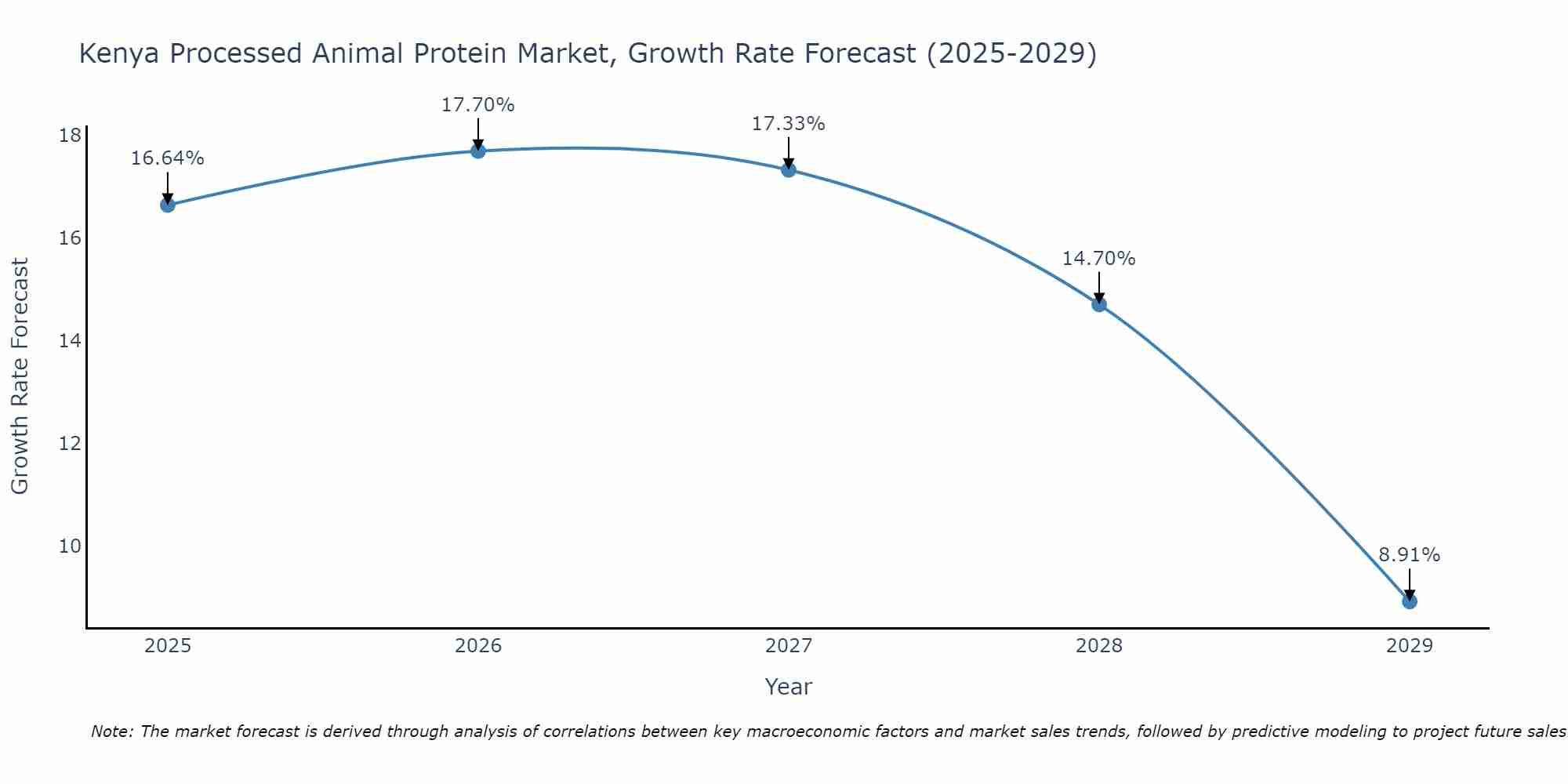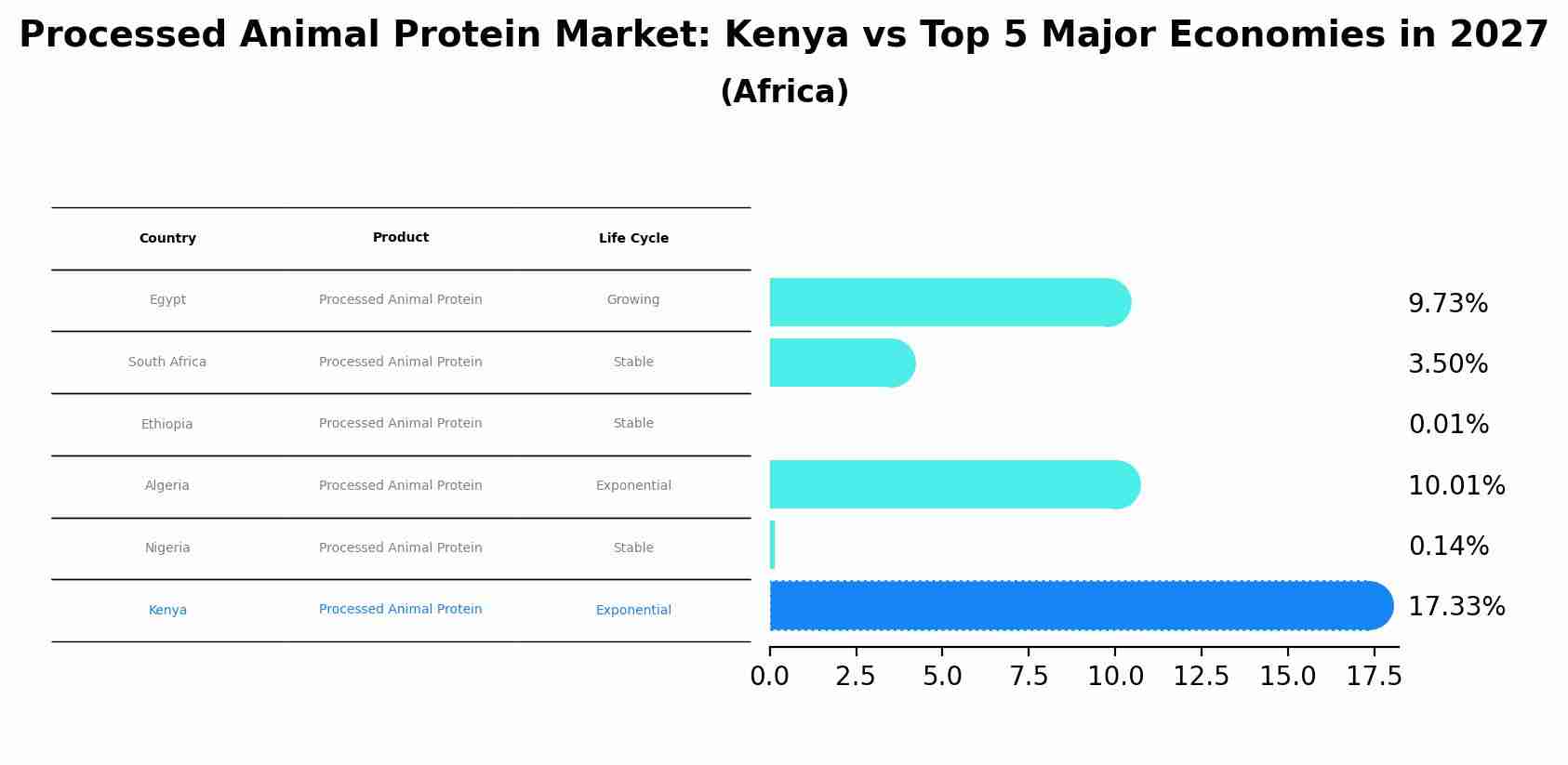Kenya Processed Animal Protein Market Outlook | Forecast, COVID-19 IMPACT, Industry, Analysis, Revenue, Size, Growth, Trends, Value, Share & Companies
| Product Code: ETC411946 | Publication Date: Oct 2022 | Updated Date: Jul 2025 | Product Type: Market Research Report | |
| Publisher: 6Wresearch | Author: Vasudha | No. of Pages: 75 | No. of Figures: 35 | No. of Tables: 20 |
Kenya Processed Animal Protein Market Size Growth Rate
The Kenya Processed Animal Protein Market is projected to witness mixed growth rate patterns during 2025 to 2029. Starting at 16.64% in 2025, the market peaks at 17.70% in 2026, and settles at 8.91% by 2029.

Processed Animal Protein Market: Kenya vs Top 5 Major Economies in 2027 (Africa)
The Processed Animal Protein market in Kenya is projected to grow at a exponential growth rate of 17.33% by 2027, within the Africa region led by Egypt, along with other countries like South Africa, Ethiopia, Algeria and Nigeria, collectively shaping a dynamic and evolving market environment driven by innovation and increasing adoption of emerging technologies.

Kenya Processed Animal Protein Market Synopsis
The Kenya Processed Animal Protein Market is experiencing steady growth driven by increasing consumer demand for convenient and high-quality protein products. The market includes a wide range of processed animal protein products such as sausages, meatballs, nuggets, and canned meats. Factors contributing to market growth include rising disposable incomes, urbanization, and changing consumer preferences towards ready-to-eat and convenience foods. Key players in the market are focusing on product innovation, quality assurance, and strategic marketing initiatives to gain a competitive edge. Additionally, government initiatives to improve food safety standards and regulations are further shaping the market landscape. Overall, the Kenya Processed Animal Protein Market presents opportunities for both domestic and international companies to capitalize on the growing demand for processed protein products in the country.
Kenya Processed Animal Protein Market Trends
In the Kenya Processed Animal Protein Market, there is a growing trend towards healthier and more sustainable options. Consumers are increasingly seeking products that are organic, free-range, and ethically sourced. There is also a rising demand for processed animal proteins that are convenient and ready-to-eat, catering to the busy urban population. Additionally, there is a shift towards alternative protein sources such as plant-based proteins, driven by health and environmental concerns. Companies in the market are focusing on product innovation and expanding their product offerings to meet the evolving preferences of consumers. Overall, the market is witnessing a transformation towards more diverse, sustainable, and health-conscious options in the processed animal protein sector.
Kenya Processed Animal Protein Market Challenges
In the Kenya Processed Animal Protein Market, some challenges include fluctuating raw material prices due to factors like weather conditions affecting agricultural production, inconsistent quality of raw materials sourced from different regions, inadequate infrastructure for storage and transportation leading to product wastage, limited access to affordable financing for market players to invest in technology and expansion, and competition from imported processed animal protein products. Additionally, regulatory issues related to food safety standards and labeling requirements pose compliance challenges for market participants. Addressing these challenges will require industry stakeholders to collaborate on improving supply chain efficiency, investing in technology and innovation, and engaging with policymakers to create a conducive regulatory environment for sustainable growth in the processed animal protein market in Kenya.
Kenya Processed Animal Protein Market Investment Opportunities
The Kenya Processed Animal Protein Market presents promising investment opportunities due to the increasing demand for high-quality animal protein products driven by population growth, urbanization, and rising incomes. Investors can consider opportunities in the production and distribution of processed meat products such as sausages, bacon, and canned meats, as well as value-added products like ready-to-eat meals and convenience foods. Additionally, investing in modern processing facilities, cold chain infrastructure, and technology to enhance efficiency and product quality can be lucrative. Collaborating with local farmers to ensure a steady supply of raw materials and implementing sustainable practices can also be key success factors in this market. Overall, the Kenya Processed Animal Protein Market offers potential for growth and profitability for investors looking to capitalize on the evolving consumer preferences and dietary habits in the region.
Jordan Agar Market Government Policies
The Kenyan government has implemented policies to regulate the processed animal protein market to ensure product safety and quality. The Kenya Bureau of Standards (KEBS) sets standards for processed animal protein products to guarantee consumer health and safety. Additionally, the Ministry of Agriculture oversees the licensing and inspection of processing facilities to maintain hygiene and compliance with regulations. Importantly, the government encourages investment in the sector through initiatives such as tax incentives and support for research and development to drive innovation and improve product quality. These policies aim to promote growth in the processed animal protein market while safeguarding public health and enhancing the reputation of Kenyan products both domestically and internationally.
Kenya Processed Animal Protein Market Future Outlook
The future outlook for the Kenya Processed Animal Protein Market appears promising, driven by factors such as increasing urbanization, rising disposable incomes, and changing dietary preferences towards protein-rich foods. The growing demand for convenience foods, coupled with a rising awareness of the nutritional benefits of animal proteins, is expected to drive market growth. Additionally, technological advancements in food processing and packaging are likely to enhance product quality and shelf life, further boosting market expansion. However, challenges such as price volatility of raw materials and competition from plant-based protein alternatives may pose some constraints. Overall, with a growing population and changing consumer preferences, the Kenya Processed Animal Protein Market is anticipated to witness steady growth in the coming years.
Key Highlights of the Report:
- Kenya Processed Animal Protein Market Outlook
- Market Size of Kenya Processed Animal Protein Market, 2021
- Forecast of Kenya Processed Animal Protein Market, 2031
- Historical Data and Forecast of Kenya Processed Animal Protein Revenues & Volume for the Period 2018 - 2031
- Kenya Processed Animal Protein Market Trend Evolution
- Kenya Processed Animal Protein Market Drivers and Challenges
- Kenya Processed Animal Protein Price Trends
- Kenya Processed Animal Protein Porter's Five Forces
- Kenya Processed Animal Protein Industry Life Cycle
- Historical Data and Forecast of Kenya Processed Animal Protein Market Revenues & Volume By Source for the Period 2018 - 2031
- Historical Data and Forecast of Kenya Processed Animal Protein Market Revenues & Volume By Poultry for the Period 2018 - 2031
- Historical Data and Forecast of Kenya Processed Animal Protein Market Revenues & Volume By Pork for the Period 2018 - 2031
- Historical Data and Forecast of Kenya Processed Animal Protein Market Revenues & Volume By Beef for the Period 2018 - 2031
- Historical Data and Forecast of Kenya Processed Animal Protein Market Revenues & Volume By Others for the Period 2018 - 2031
- Historical Data and Forecast of Kenya Processed Animal Protein Market Revenues & Volume By Form for the Period 2018 - 2031
- Historical Data and Forecast of Kenya Processed Animal Protein Market Revenues & Volume By Dry for the Period 2018 - 2031
- Historical Data and Forecast of Kenya Processed Animal Protein Market Revenues & Volume By Liquid for the Period 2018 - 2031
- Kenya Processed Animal Protein Import Export Trade Statistics
- Market Opportunity Assessment By Source
- Market Opportunity Assessment By Form
- Kenya Processed Animal Protein Top Companies Market Share
- Kenya Processed Animal Protein Competitive Benchmarking By Technical and Operational Parameters
- Kenya Processed Animal Protein Company Profiles
- Kenya Processed Animal Protein Key Strategic Recommendations
Frequently Asked Questions About the Market Study (FAQs):
Export potential assessment - trade Analytics for 2030
Export potential enables firms to identify high-growth global markets with greater confidence by combining advanced trade intelligence with a structured quantitative methodology. The framework analyzes emerging demand trends and country-level import patterns while integrating macroeconomic and trade datasets such as GDP and population forecasts, bilateral import–export flows, tariff structures, elasticity differentials between developed and developing economies, geographic distance, and import demand projections. Using weighted trade values from 2020–2024 as the base period to project country-to-country export potential for 2030, these inputs are operationalized through calculated drivers such as gravity model parameters, tariff impact factors, and projected GDP per-capita growth. Through an analysis of hidden potentials, demand hotspots, and market conditions that are most favorable to success, this method enables firms to focus on target countries, maximize returns, and global expansion with data, backed by accuracy.
By factoring in the projected importer demand gap that is currently unmet and could be potential opportunity, it identifies the potential for the Exporter (Country) among 190 countries, against the general trade analysis, which identifies the biggest importer or exporter.
To discover high-growth global markets and optimize your business strategy:
Click Here- Single User License$ 1,995
- Department License$ 2,400
- Site License$ 3,120
- Global License$ 3,795
Search
Thought Leadership and Analyst Meet
Our Clients
Related Reports
- Saudi Arabia Car Window Tinting Film, Paint Protection Film (PPF), and Ceramic Coating Market (2025-2031) | Strategy, Consumer Insights, Analysis, Investment Trends, Opportunities, Growth, Size, Share, Industry, Revenue, Segments, Value, Segmentation, Supply, Forecast, Restraints, Outlook, Competition, Drivers, Trends, Demand, Pricing Analysis, Competitive, Strategic Insights, Companies, Challenges
- South Africa Stationery Market (2025-2031) | Share, Size, Industry, Value, Growth, Revenue, Analysis, Trends, Segmentation & Outlook
- Afghanistan Rocking Chairs And Adirondack Chairs Market (2026-2032) | Size & Revenue, Competitive Landscape, Share, Segmentation, Industry, Value, Outlook, Analysis, Trends, Growth, Forecast, Companies
- Afghanistan Apparel Market (2026-2032) | Growth, Outlook, Industry, Segmentation, Forecast, Size, Companies, Trends, Value, Share, Analysis & Revenue
- Canada Oil and Gas Market (2026-2032) | Share, Segmentation, Value, Industry, Trends, Forecast, Analysis, Size & Revenue, Growth, Competitive Landscape, Outlook, Companies
- Germany Breakfast Food Market (2026-2032) | Industry, Share, Growth, Size, Companies, Value, Analysis, Revenue, Trends, Forecast & Outlook
- Australia Briquette Market (2025-2031) | Growth, Size, Revenue, Forecast, Analysis, Trends, Value, Share, Industry & Companies
- Vietnam System Integrator Market (2025-2031) | Size, Companies, Analysis, Industry, Value, Forecast, Growth, Trends, Revenue & Share
- ASEAN and Thailand Brain Health Supplements Market (2025-2031) | Strategy, Consumer Insights, Analysis, Investment Trends, Opportunities, Growth, Size, Share, Industry, Revenue, Segments, Value, Segmentation, Supply, Forecast, Restraints, Outlook, Competition, Drivers, Trends, Demand, Pricing Analysis, Competitive, Strategic Insights, Companies, Challenges
- ASEAN Bearings Market (2025-2031) | Strategy, Consumer Insights, Analysis, Investment Trends, Opportunities, Growth, Size, Share, Industry, Revenue, Segments, Value, Segmentation, Supply, Forecast, Restraints, Outlook, Competition, Drivers, Trends, Demand, Pricing Analysis, Competitive, Strategic Insights, Companies, Challenges
Industry Events and Analyst Meet
Whitepaper
- Middle East & Africa Commercial Security Market Click here to view more.
- Middle East & Africa Fire Safety Systems & Equipment Market Click here to view more.
- GCC Drone Market Click here to view more.
- Middle East Lighting Fixture Market Click here to view more.
- GCC Physical & Perimeter Security Market Click here to view more.
6WResearch In News
- Doha a strategic location for EV manufacturing hub: IPA Qatar
- Demand for luxury TVs surging in the GCC, says Samsung
- Empowering Growth: The Thriving Journey of Bangladesh’s Cable Industry
- Demand for luxury TVs surging in the GCC, says Samsung
- Video call with a traditional healer? Once unthinkable, it’s now common in South Africa
- Intelligent Buildings To Smooth GCC’s Path To Net Zero


















